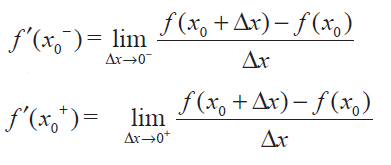HOW TO CHECK DIFFERENTIABILITY OF A FUNCTION AT A POINT
The function is differentiable from the left and right. As in the case of the existence of limits of a function at x0, it follows that

exists if and only if both

exist and f' (x0-) = f' (x0+)
Hence

if and only if f' (x0-) = f' (x0+) . If any one of the condition fails then f'(x) is not differentiable at x0.
Question 1 :
(i) f(x) = |x| + |x - 1| at x = 0, 1
Solution :
f(x) = |x| + |x - 1|
Check if the given function is continuous at x = 0.
If x < 0, then f(x) = -x - (x - 1)
f(x) = -x - x + 1
= -2x + 1
If x > 0 and x < 1, then f(x) = x - (x - 1)
f(x) = x - x + 1
= 1
If x > 1, then f(x) = x + (x - 1)
f(x) = x + x + 1
= 2x + 1
f'(0-) = lim x->0- [(f(x) - f(0)) / (x - 0)]
= lim x->0- [(-2x + 1) - 1] / x
= lim x->0- -2x / x
= lim x->0- -2
= -2 -----(1)
f'(0+) = lim x->0+ [(f(x) - f(0)) / (x - 0)]
= lim x->0+ [1 - 1] / x
= lim x->0- 0 / x
= 0/0 -----(2)
f'(0-) ≠ f'(0+)
f'(1-) = lim x->1- [(f(x) - f(1)) / (x - 1)]
= lim x->1- [1 - 1] / (x - 1)
= lim x->1- 0 / (x-1)
= 0 -----(1)
f'(1+) = lim x->1+ [(f(x) - f(1)) / (x - 1)]
= lim x->1+ [2x + 1 - 3] / (x - 1)
= lim x->1+ (2x - 2) / (x - 1)
= lim x->1+ 2(x - 1) / (x - 1)
= 2 -----(2)
f'(1-) ≠ f'(1+)
Hence the given function is not differentiable at the given points.
(ii) f(x) = sin |x| at x = 0
Solution :
If x < 0, then f(x) = sin (-x)
f(x) = - sin x
If x > 0, then f(x) = sin x
f (x) = sin x
f'(0-) = lim x->0- [(f(x) - f(0)) / (x - 0)]
= lim x->0- [(-sin x) - 0] / x
= lim x->0- -(sin x/x)
= -1 -----(1)
f'(0+) = lim x->0+ [(f(x) - f(0)) / (x - 0)]
= lim x->0+ [(sin x) - 0] / x
= lim x->0- (sin x/x)
= 1 -----(2)
f'(0-) ≠ f'(0+)
Hence the given function is not differentiable at x = 0.
Kindly mail your feedback to v4formath@gmail.com
We always appreciate your feedback.
©All rights reserved. onlinemath4all.com
Recent Articles
-
Digital SAT Math Problems and Solutions (Part - 150)
Apr 25, 25 11:46 AM
Digital SAT Math Problems and Solutions (Part - 150) -
AP Calculus AB Problems with Solutions (Part - 19)
Apr 24, 25 11:10 PM
AP Calculus AB Problems with Solutions (Part - 19) -
AP Calculus AB Problems with Solutions (Part - 18)
Apr 24, 25 11:06 PM
AP Calculus AB Problems with Solutions (Part - 18)
